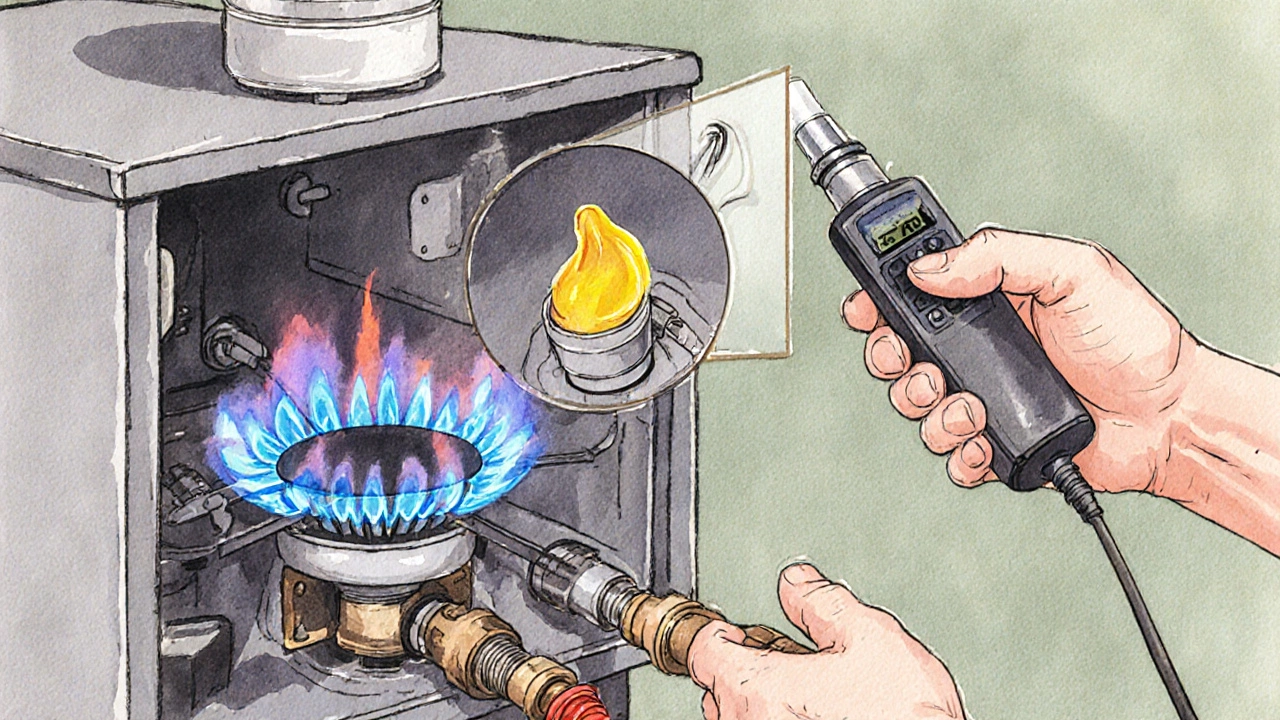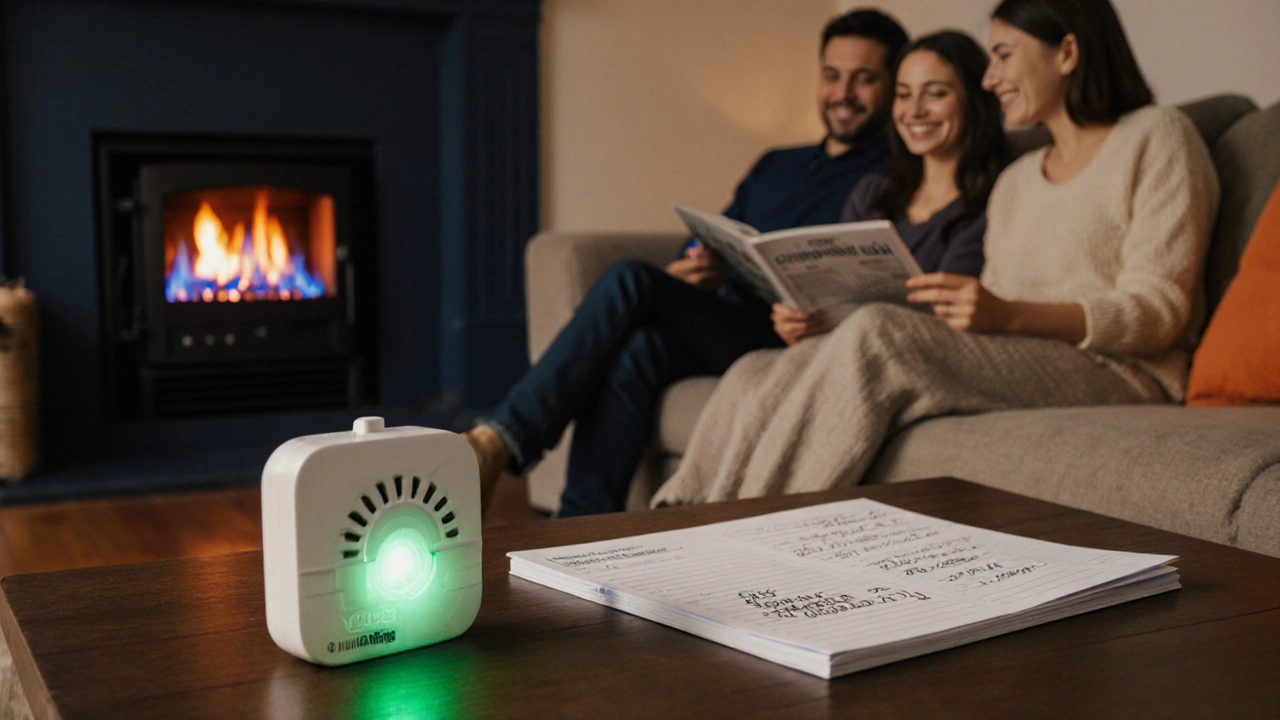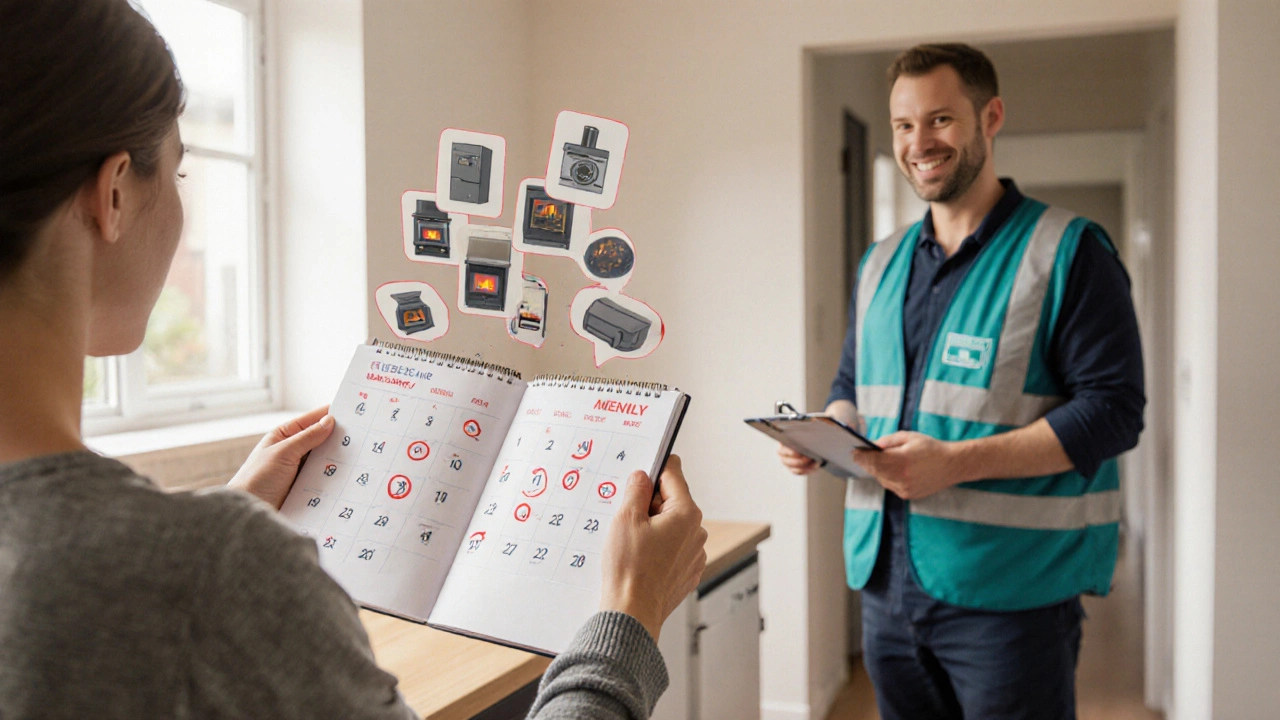Gas Appliance Inspection Calculator
How Often Should You Check Your Gas Appliances?
This tool calculates your recommended inspection frequency based on New Zealand regulations and industry best practices.
Recommended Inspection Interval
Quick Takeaways
- NZ law requires a licensed gasfitter to inspect any gas appliance at least every 5years, but many experts recommend yearly checks for high‑usage units.
- Boilers, hot‑water heaters, and gas fires should be inspected annually; cooktops and ovens can be safe with a 3‑year interval.
- Look out for yellow flames, foul smells, sputtering, or a noisy pressure regulator - they’re signs an inspection is due now.
- Keep a written record of each check, including the fitter’s licence number, to stay compliant and protect insurance.
- Combine the safety check with a carbon‑monoxide detector test to cover the whole gas system.
When it comes to gas appliances, timing isn’t just a suggestion - it’s a safety rule and a legal requirement in New Zealand. Getting the right check schedule can prevent leaks, carbon‑monoxide poisoning, and costly repairs. Below we break down exactly how often each common appliance should be inspected, what the law says, and how you can spot trouble before the fitter even arrives.
Gas appliance is a device that uses natural gas or LPG to produce heat or energy for cooking, heating water, space heating, or powering other household functions. Typical examples include boilers, hot‑water heaters, gas stoves, gas fires, and outdoor heaters.
Why Inspection Frequency Matters
Gas burns cleanly only when the fuel‑air mixture, combustion chamber, and exhaust pathways are in good shape. Over time, wear, corrosion, and dust can throw that balance off, leading to incomplete combustion. The result? Reduced efficiency, higher bills, and a dangerous buildup of carbon monoxide (CO). Regular checks keep the system operating safely and efficiently.
Legal Landscape in New Zealand
Under the Gas Act 1992 and the Building Code (G12 - Combustible Gas), any gas installation must be serviced by a licensed gasfitter. The law mandates a safety check at least once every five years for all fixed‑installation gas appliances. However, the <Gas Safe Register guidelines advise annual inspections for high‑risk units such as boilers and gas fires.

Recommended Check Intervals by Appliance Type
| Appliance | Legal Minimum | Industry Best Practice | Key Warning Signs |
|---|---|---|---|
| Boiler (hot‑water or central heating) | Every 5years | Annually | Fluctuating pressure, strange noises, yellow flame, water leakage |
| Hot‑water cylinder with gas burner | Every 5years | Every 2years | Longer heating times, rusty water, pilot light issues |
| Gas stove or oven | Every 5years | Every 3years | Uneven flames, sputtering, odor when igniting |
| Gas fire (wood‑burning alternative) | Every 5years | Annually | Discolored flames, excess soot, loud clicking |
| Outdoor gas heater | Every 5years | Every 2years | Weak flame, rust on gas pipe, gas smell after use |
| Gas‑powered clothes dryer | Every 5years | Every 3years | Dryer takes longer, frequent shut‑offs, odour |
What the Inspection Actually Covers
A licensed gasfitter will run through a checklist that touches on at least six core components:
- Gas pipe integrity - checking for corrosion, leaks, and proper support.
- Pressure regulator function - ensuring the regulator holds the correct pressure (typically 20-30kPa for domestic supply).
- Burner and vent cleaning - removing soot, dust, and any blockage that could affect combustion.
- Flame quality - a blue flame with a faint inner cone indicates proper mixing; yellow tips signal excess carbon.
- Safety devices - testing the thermocouple, flame‑fail sensor, and any built‑in CO detectors.
- Documentation - confirming the fitter’s licence number, date of service, and any corrective actions taken.
These steps protect you from hidden hazards and keep the appliance running at peak efficiency, which can shave 5‑15% off your gas bill.
Spotting Problems Between Checks
Even with a perfect schedule, you might notice something off. Here’s a short cheat‑sheet you can keep on the fridge:
- Yellow or flickering flame: Incomplete combustion - call a fitter immediately.
- Hissing or whistling sound: Possible leak - ventilate the area and shut off the main gas valve.
- Sudden increase in gas usage: Could be a faulty regulator or dirty burner.
- Headaches or nausea after using an appliance: Likely carbon monoxide - install a detector and get a professional check.
DIY Maintenance Tips to Extend the Interval
You don’t need a licence for routine care, but a few simple steps can keep the fitter’s job easier:
- Wipe the burner ports with a soft brush after each use to prevent soot buildup.
- Check the vent pipe for bird nests or debris at least twice a year.
- Replace the pilot‑light tip if the flame looks weak; it’s cheap and often DIY‑friendly.
- Test all CO detectors monthly by pressing the test button; replace them every five years.
- Keep the area around the gas pipe clear of flammable materials.

Choosing the Right licensed gasfitter
Not every plumber can work on gas. Look for these credentials:
- Valid Gas Safe Register number - you can verify it online.
- Experience with the specific appliance type (e.g., boiler specialists).
- Insurance that covers gas‑related work.
- Positive customer reviews that mention punctuality and thoroughness.
When you call, ask for a written quote that includes the inspection, any cleaning, and a report of findings. That record is crucial if you later need to claim insurance or prove compliance to a landlord.
Cost Expectations
Average fees in Wellington for a standard gas appliance inspection range from NZ$120 to NZ$200 per unit. Boiler checks tend to be on the higher end because they involve more components. If you schedule multiple appliances in one visit, many fitters will offer a bundle discount - often 10‑15% off the total.
What to Do After the Inspection
Once the fitter hands you the report, follow these steps:
- Read the report line‑by‑line; note any “urgent” tags.
- Schedule any recommended repairs within the week; safety issues shouldn’t wait.
- Update your home maintenance log - a simple spreadsheet works.
- Notify your insurer if a major issue was corrected; some policies reduce premiums after a clean bill of health.
Frequently Asked Questions
Do I really need a gas‑safety check every five years?
Yes. New Zealand law requires a licensed gasfitter to perform a safety check at least once every five years for all fixed gas appliances. Skipping this can void insurance and breach the Building Code.
Can I perform my own gas‑line leak test?
You can use a soap‑water solution on visible joints to spot bubbling, but any suspected leak should be handled by a licensed gasfitter. DIY repairs are illegal and dangerous.
What’s the difference between a gasfitter and a plumber?
All gasfitters are licensed tradespeople, but only those with a specific gas‑fit licence can work on gas pipework and appliances. Plumbers may handle water fittings but not gas unless they hold the extra certification.
How can I tell if my carbon‑monoxide detector works?
Press the test button - the alarm should sound immediately. Replace the detector every five years or when the low‑battery chirp starts.
Is there a penalty for not complying with the five‑year check?
Breaching the Gas Act can lead to fines up to NZ$10,000 and can invalidate homeowner’s insurance. It also poses serious safety risks.
Can I bundle multiple appliance checks into one appointment?
Yes, most fitters will service several appliances in a single visit and often give a discount. Just confirm the total time needed - a full‑size boiler takes longer than a single stove.
Sticking to a sensible inspection schedule isn’t just about ticking a legal box - it’s about keeping your home safe, your bills low, and your peace of mind high. Mark your calendar, keep a record, and call a licensed gasfitter before the next deadline creeps up.

